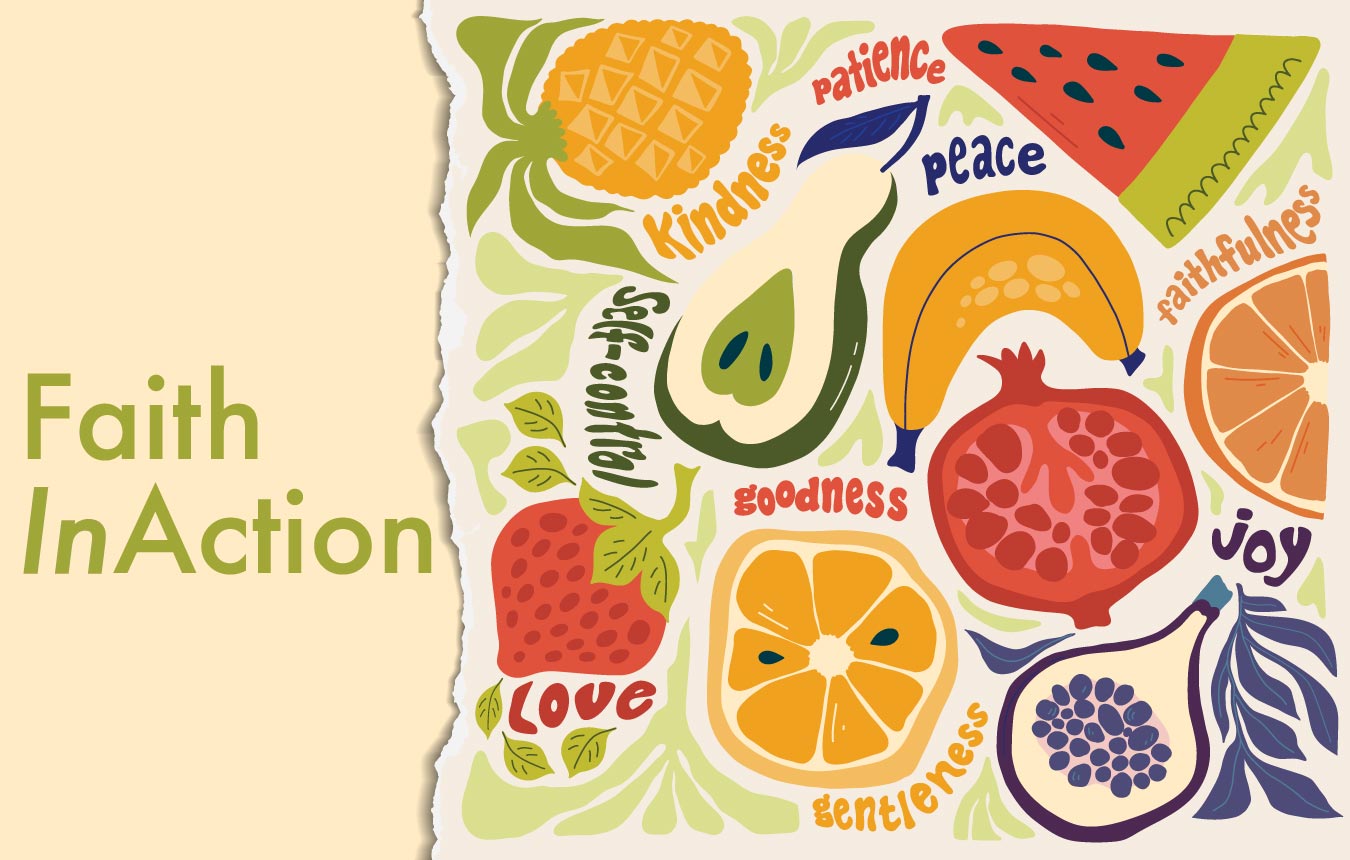
Concordia Seminary Newsroom
Faith in Action

by Dr. Timothy Saleska
I must confess that whenever I hear a phrase like “faith into action,” I get a twinge of anxiety that will soon be followed by pangs of guilt. I start to imagine the Christian life (which is what I think about when I hear the phrase “faith into action”) like a daily pep talk given to used car salespeople: “All right, you all represent God. We have an unbeatable product that you can believe in. It sells itself. Now go out there and find someone to serve.”
Sometimes, sermons hit me this way. After being told all that God has done for me, it is assumed that I now have all the motivation I need to go out into the world and do something for Him, as if faith makes the hard easy or the hesitant bold. Guilt sets in because I feel like I never do enough. And often, I do grudgingly what I know I should do willingly. My love turns more inward than outward. My motivation gets weaker with age. Sigh.
But this is a bad way to think about the phrase “faith into action” and a bad way to think about the Christian life. It is to imagine the Christian life in terms of the Law and not the Gospel. This is dangerous. And it is to misunderstand both “faith” and “action.” Also, dangerous. In what follows, I am going to give you a better, certainly more relaxing, way to think about the phrase “faith into action” and thus also your Christian life.

Faith is trust in a promise, specifically, the promises that God makes us in the Gospel. Christians trust that God is faithful and will do what He promises. The faith of Christians is created and nurtured by the Holy Spirit through the promises that God gives us and in His promises themselves. Faith is not a motivating power that moves me to do certain actions (like selling my house and coming to the Seminary). Nor is faith thinking that anything I do in God’s name is God’s will.
But when the Holy Spirit works faith, you do become a different person. For example, one day Saul (Paul) was on his way to Damascus breathing threats and murder against Christians. Suddenly, the risen Jesus Himself confronted Saul, and the confrontation left him blind. But God sent Ananias so that Saul (Paul) would regain his sight and be filled with the Holy Spirit. Paul was baptized, and he came out a different person. Some days later, to the amazement of people who knew him, he was in the synagogues of Damascus proclaiming that Jesus was the Son of God (Acts 9). What happened? To all those who heard him, Saul had become a different person.
“It makes sense for me to think about my Christian life more in terms of who I am rather than what I do.”
Although Paul’s conversion seems to be a unique and dramatic experience, the way Paul tells it, when the Holy Spirit works faith in us, it is no less a miraculous work. This is why it is not uncommon for Paul to describe what happens to us when the Holy Spirit works faith in terms of a death and a resurrection. For example, “I have been crucified with Christ. It is no longer I who live, but Christ who lives in me. And the life I now live in the flesh I live by faith in the Son of God, who loved me and gave himself for me (Gal. 2:20; cf., Eph. 4:22-24; Col. 3:1-10; 2 Cor. 5:17; Gal. 5:17; Rom. 6:3-4).” To be crucified and raised with Christ is a mighty act of God.
As Paul tells it, he became a different person because the Holy Spirit put to death his old self and raised a new self in him. He was an unbeliever and he became a believer. His new self was a trusting self. That’s what the Holy Spirit does. That is what faith is.

So, when I realize that when the Holy Spirit works faith in people, He makes us into different persons — killing the old self and raising the new — it influences how I think about the Christian life. It makes sense for me to think about my Christian life more in terms of who I am rather than what I do. That is to say, in terms of qualities rather than actions.
Paul, who knows what he is talking about, encourages me in this way of thinking. For example, when Paul talks about the fruits of the Spirit, he doesn’t use action words, he uses words that describe qualities or characteristics. Thus, the fruits of the Spirit are love, joy, peace, patience, kindness, goodness, faithfulness, gentleness and self-control (Gal. 5:22-23).
No matter what the vocations of people might be, people filled with the Holy Spirit are people who are full of love. People at peace in themselves. People who are patient, kind, good, faithful, gentle and moderate. As a result, because this is who they are, without calculation or even much thought, this is the way they treat others. With hearts of love, they love others. Kind and patient people treat others with patience and kindness. People at peace in themselves sow peace among others and so on.
However, as all of us are painfully aware, at the present time, we often fail to live as the kind of people we are because sin still dwells within us. We are sinners and evil qualities give rise to evil actions, the so-called works of the flesh. As Jesus says, “Out of the heart come evil thoughts, murder, adultery, sexual immorality, theft, false witness, slander” (Matt. 15:19 ESV). Paul says that in a Christian the desires of our flesh are in an ongoing struggle against the desires of the Spirit (Gal. 5:17; Rom. 7:22-25; cf., Col. 3:1-10). And the Christian life is as much the one as the other.
This is the reason that I don’t seem to be able to do what I know I should. I’m a selfish, lazy, unloving sinner. Even my best actions are shaded by self-interest and self-love. Some days, it seems as if I am starting from scratch, in need of God’s forgiveness, in need of God’s resurrecting Word. I can never get beyond that. “Wretched man that I am! Who will deliver me from this body of death? Thanks be to God through Jesus Christ our Lord!” (Rom. 7:24-25 ESV).
In the first part of this verse, I sense Paul’s frustration and grief, but in the second, his joy and peace. Paul’s words of thanksgiving relax me. They remind me that God does all the work on me. I can’t make progress overcoming my sin. I have to be pulled from it. I have to die to it. And this is all the work of the Holy Spirit. Again, He does this through the Gospel promise. As He comes to me every day in that promise, He delivers me from sin and death and raises me as a new creature.

Given all of this, how should we think about our Christian lives in this world? How should the professors think about what they do here at the Seminary? And how should students think about what they do — all the papers and tests and classes and field work?
What we should not do is set up a separate category of deeds under the heading “faith into action,” as if there are certain tasks that qualify and certain ones that do not, or certain vocations that qualify and certain ones that do not. And this means that we should not put “coming to the Seminary to become a deaconess or pastor” as a holier action than studying to be a doctor, carpenter, teacher or anything else. Students are not holier or closer to God by virtue of their vocation than anyone else. Neither are pastors.
A better way to think about “faith into action” is to realize that since God does all the work to save us, and since our future is utterly secure in Christ, until Jesus returns, every one of us is called to carry out the vocations in which we have been placed. And in carrying out our vocations, in the nitty-gritty details of our relationships, we ask God for strength to put off the qualities and deeds of the flesh that war against us — the anger, wrath, malice, slander and lies — that hurt those around us. And we ask Him for strength to put on the qualities and deeds of Jesus, who lives in us — compassionate hearts, kindness, humility, meekness, patience, forgiveness (Col. 3:1-10) — that uplift and nurture those around us. In other words, we ask God for the strength to live each day and each moment as the kind of people we really are.
This is no different for students, staff and Seminary professors. We have all been put here at the Seminary to do the work that God has given us to do. And in the “nitty-gritty” of doing our work together, we pray that the Holy Spirit produce His fruits in us and in our lives, and that He gives us the strength to live as the justified and sanctified people we are because of the grace that He gives us.
I will close with a lovely prayer that is relevant to all that I have been saying. Very relaxing:

Dr. Timothy Saleska is professor of Exegetical Theology, dean of Ministerial Formation, and the Gustav and Sophie Butterbach Professor of Exegetical Theology at Concordia Seminary, St. Louis.